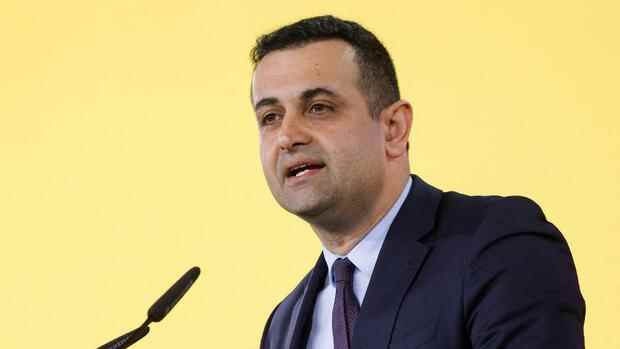Berlin As a reaction to the Ukraine war, the FDP calls for a reorganization of German security and defense policy. On Monday, the party’s national executive wants to adopt a motion in which it pleads for the “immediate establishment of a National Security Council (NSR)”. The paper is available to the Handelsblatt.
“Due to the Ukraine war, we are suddenly seeing what has been known for years: Germany must be prepared for very real external threats,” said FDP General Secretary Bijan Djir-Sarai, explaining the Liberals’ move. “The Free Democrats’ demand for the establishment of a National Security Council is the consistent and strategic continuation of a so-called networked approach.” That means shaping foreign, security and development policy together and across departments.
“We need a paradigm shift in security policy thinking in Germany,” says the motion. “The federal government must now take measures to bring about such a turnaround both in people’s minds and in the previously incoherent network of our foreign, security and development policy.”
According to the FDP’s proposal, the NSR should be “received the mandate of a higher-level early warning system and navigation tool for emerging war, crisis and conflict situations,” as the application states. The goal is to create recommendations for action from a single source for the federal government.
Top jobs of the day
Find the best jobs now and
be notified by email.
So far there is a Federal Security Council. This is a cabinet committee of the federal government that deals with the strategic orientation and coordination of German security policy. Chaired by the Federal Chancellor, it is made up of the Federal Ministers for Foreign Affairs, Defence, Finance, the Interior, Justice, Economics, Development and the Head of the Federal Chancellery. The meetings take place irregularly, the deliberations are secret.
Strauss was instrumental in founding the Federal Security Council in the 1950s.
(Photo: AP)
The then Federal Minister for Special Tasks, Franz-Josef Strauss, justified the founding of the body in 1955 by saying that “external security cannot be the sole responsibility of soldiers and that national defense is also dependent on other functions of the state”. In its motion, however, the FDP criticizes the fact that the council has recently mainly only dealt with controlling the export of armaments.
The FDP writes that the Federal Security Council is not suitable “to meet the security-endangering and risky challenges of the present-day international system”. However, it could “serve as a nucleus in order to develop a structurally strengthened and institutionally expanded NSR with its own competencies, resources and capacities”.
Specifically, the FDP calls for the Federal Security Council to be “transformed into a permanent, cross-departmental and cross-agency institution with a management secretariat and a situation and analysis center on the basis of a constitutional legal basis”.
The call for a National Security Council is not new
The call for the establishment of an NSR is not new. In November 2019, the then Defense Minister Annegret Kramp-Karrenbauer proposed in a keynote speech at the Bundeswehr University in Munich that the Federal Security Council be further developed into a National Security Council.
Read here: A turning point for Europe’s politics and economy: This is how Vladimir Putin’s war is reorganizing the world
After the chaos caused by the withdrawal of the Allied troops from Afghanistan and the surprisingly rapid advance of the Taliban, the Union’s chancellor candidate at the time, Armin Laschet (CDU), renewed the proposal. During the election campaign, he presented a paper on security policy. In it, the Union pleaded for a National Security Council in the Federal Chancellery that “combines foreign and security policy coordination, strategic foresight and intelligence findings from the federal and state governments”.
The FDP raised the issue again in the traffic light coalition talks. However, the NSR is not in the coalition agreement. From the point of view of the security policy spokeswoman for the Greens parliamentary group, Sara Nanni, the Council does not solve existing problems because the authority to issue instructions remains with the ministries, so the departmental principle is not touched.
In principle, however, the federal government should be open to breaking new ground in interministerial coordination. Coming to a joint assessment of the situation would “certainly be an important goal,” said Nanni.
More: This is how Vladimir Putin’s war is reorganizing the world.
